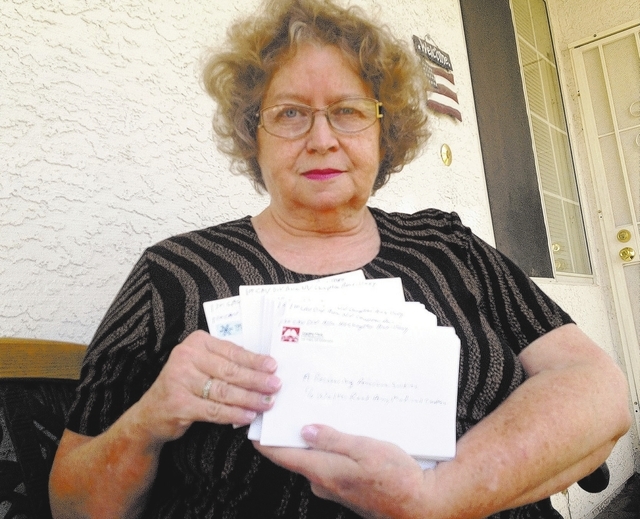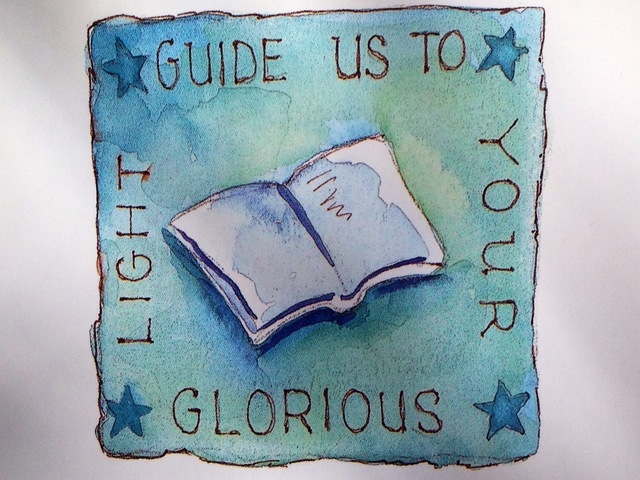Nevada woman accuses military hospitals of being grinches at Christmastime


It was a simple gesture of “peace and good will.”
Angeline Clark and women of the 1st Cavalry Division Association auxiliary in Southern Nevada had hoped it would help bedridden soldiers at a Maryland hospital for veterans “have a blessed Christmas.”
At least that is the message of the 62 cards they had signed. Each one displayed a powder blue square with a nondescript open book surrounded by the words, “Guide Us To Your Glorious Light.”
Now, Clark is counting the days until Christmas so she once again can send the batch that she hopes won’t be rejected by what amounts to, in her mind, a system of federal Grinches.
Her hopes were dashed twice during the December holidays. First, when the Walter Reed National Military Medical Center in Bethesda, Md., returned them because the pack wasn’t channeled through the Red Cross.
The second time, the Veterans Affairs Medical Center in North Las Vegas rejected them because the cards contained religious content, she said.
“I mailed them two weeks before Christmas with priority mail,” Clark, 65, said about her attempt to mail them to the Walter Reed center, through a forwarding address in Washington, D.C. “To my heartbreak, when I came home a few days before Christmas, the returned package was sent back to me, saying they would not forward it or accept it.
“I was just heartbroken.”
Then she tried to deliver them to the VA Medical Center on Pecos Road. But they were rejected after someone opened one of the cards “and it seemed to be religious,” Clark said.
On Friday, a VA spokesman said leadership at the VA Southern Nevada Healthcare System “is not aware of holiday cards being turned away. We welcome the gesture from our community in support of our veterans.”
Nevertheless, Clark is upset at a policy that she believes shouldn’t trump the freedoms that veterans served and defended.
“I feel it’s my right to have my freedom of speech and send a card with love and care and a blessing for soldiers who are wounded,” said Clark, whose husband, Milton, served as an Army helicopter pilot in the Gulf War.
A Red Cross volunteer said if Clark sends her cards to the Red Cross outlet when an acceptance period is announced in December, they will be sent to a contractor in the Washington, D.C., area for screening.
If the screener determines they are appropriate for patients at the Walter Reed center and the content is deemed nonreligious, meaning Bible passages aren’t cited, and they don’t contain glitter that could affect medical conditions in hospital rooms, then they would probably be distributed.
The words “God bless,” or “have a blessed Christmas” probably would be all right for the military hospital, the volunteer said.
But sending them to VA facilities still could be a problem.
The 1st Cavalry shared its misery with other groups whose “Merry Christmas” cards — including some crafted by fourth-graders at a Texas school — were turned down by a VA hospital in Dallas.
In that case, VA officials cited the policy in the Veterans Health Administration handbook and issued a statement saying, “In order to be respectful of our veterans’ religious beliefs, all donated holiday cards are reviewed by a multidisciplinary team of staff led by chaplaincy services and determined if they are appropriate (nonreligious) to freely distribute to patients.”
The VA’s statement goes on to say that “after the review is complete, the holiday cards that reference religious and/or secular tones are then distributed by Chaplaincy Service on a one-on-one basis if the patient agrees to the religious reference in the holiday card donation. The holiday cards that do not contain religious and/or secular tones are distributed freely to patients across the Health Care System.”
A VA West Coast spokesman provided a statement Friday in response to a Review-Journal query about Clark’s concerns.
“We continue to accept religious cards and Christmas carols for our patients who celebrate Christmas, as we do for Veterans who celebrate religious holidays of all faiths,” the statement reads. “VA’s policy guidance on holiday donations has not changed and regrets any misunderstandings that occurred at any facility at Christmas.”
The statement acknowledges that veterans served “to protect our freedoms, including the freedom to practice a religion of our choice. At VA, it is our duty to uphold and respect the honor and sacrifice of all Veterans, from all faiths and backgrounds.”
Officials said that VA chaplains are entrusted to protect patients from having religion imposed upon them out of respect for veterans who might not celebrate Christmas. Like in the Dallas case, that is where a review of holiday cards can result in their rejection because of religious content.
That policy, however, isn’t consistent with the practice and tradition of another branch of the federal government, the U.S. Postal Service.
While the VA potentially won’t accept Christmas cards because of their religious content policy, the Postal Service nevertheless sells holiday stamps with religious themes such as the Holy Family stamp, issued Oct. 11. It has an illustration of Joseph leading a donkey that carries Mary and Jesus, guided by a star shining above a desert sky. A sheet of 20 sells for $9.80.
The Holy Family stamp “celebrates Christmas with a scene from the Nativity story that reminds us of the joys of the season: family, togetherness, and the birth of the baby Jesus. It continues the U.S. Postal Service’s tradition of issuing beautiful and timeless Christmas stamps and will be a treasured addition to cards and letters sent during this season of goodwill and sharing,” reads the advertisement on the Postal Service’s website.
When asked whether the VA’s religious-content policy pertains to postal stamps, the West Coast VA spokesman, Dave Bayard, wrote in an email that “the statement previously provided is all we have to share on this matter.”
Contact reporter Keith Rogers at krogers@reviewjournal.com or 702-383-0308. Follow him on Twitter @KeithRogers2.












